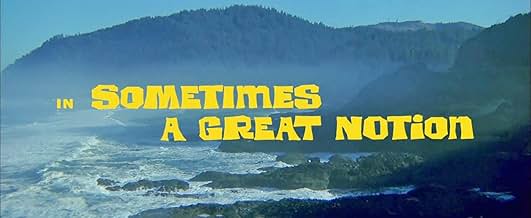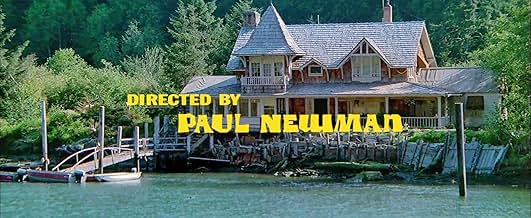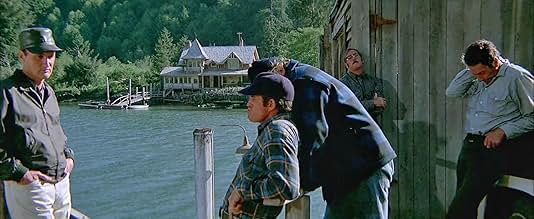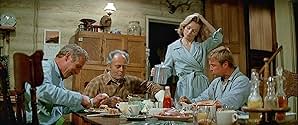NOTE IMDb
6,9/10
4,8 k
MA NOTE
Une famille de bûcherons de l'Oregon farouchement indépendants se bat pour maintenir à flots l'activité familiale en des temps de changement.Une famille de bûcherons de l'Oregon farouchement indépendants se bat pour maintenir à flots l'activité familiale en des temps de changement.Une famille de bûcherons de l'Oregon farouchement indépendants se bat pour maintenir à flots l'activité familiale en des temps de changement.
- Nommé pour 2 Oscars
- 2 nominations au total
Avis à la une
Kesey's superb epic novel with its shifting points of view and verb tense is far too complex a work to adapt directly. Kesey's prose while exceptionally cinematic in its description and action ironically proves unfilmable.
That said, Paul Newman and his production team have created a most admirable and solid, if rather top heavy adaption of Kesey's excellent novel.
The dialogue while rather shallow and weak in spurts (Kesey's rich vernacular is lost)is overcome by a wonderful ensemble cast featuring some of America's finest. Who better that Henry Fonda to play Newman's father? Richard Jaekel richly earns the Oscar nomination as the dim-witted but enthusiastic born again lumberjack Joe-Ben. The famous scene where Newman tries desperately to save Jaekel's character from drowning is heartbreakingly tragic and darkly comic. It is a marvelous example of direction.
Newman spent a great deal of time in my native Oregon researching the part and the film and his homework shows. Kesey's rich descriptions of the land remain largely intact. The sense of time and place is impressively captured in the photography of rusting metal, dripping ferns, rotting wood and mildewed carpets. This is a film that one can almost smell.
Newman is one of the finest artists ever to come out of Hollywood. Not only as an actor, but also as a director. He instinctivly knows how to illicit naturalistic, comfortable and utterly human performances from his casts and Sometimes a Great Notion is no exception. Well worth a look. 7 out of 10 stars.
That said, Paul Newman and his production team have created a most admirable and solid, if rather top heavy adaption of Kesey's excellent novel.
The dialogue while rather shallow and weak in spurts (Kesey's rich vernacular is lost)is overcome by a wonderful ensemble cast featuring some of America's finest. Who better that Henry Fonda to play Newman's father? Richard Jaekel richly earns the Oscar nomination as the dim-witted but enthusiastic born again lumberjack Joe-Ben. The famous scene where Newman tries desperately to save Jaekel's character from drowning is heartbreakingly tragic and darkly comic. It is a marvelous example of direction.
Newman spent a great deal of time in my native Oregon researching the part and the film and his homework shows. Kesey's rich descriptions of the land remain largely intact. The sense of time and place is impressively captured in the photography of rusting metal, dripping ferns, rotting wood and mildewed carpets. This is a film that one can almost smell.
Newman is one of the finest artists ever to come out of Hollywood. Not only as an actor, but also as a director. He instinctivly knows how to illicit naturalistic, comfortable and utterly human performances from his casts and Sometimes a Great Notion is no exception. Well worth a look. 7 out of 10 stars.
I have read Kesey's novel several times over the last 30 years or so. While I see some merit in this movie version, I'd like to see someone have another go at it. The movie only captures the novel in broad strokes. It hits the major point (brother returns to hometown to exact revenge on older sibling), but misses a lot of the flavor. I think Paul Newman, Henry Fonda and Lee Remick were perfect, as were many of the supporting cast. But Michael Sarrazin didn't quite do it for me. Maybe it was the hair, idunno. I always pictured a sort of geeky-looking, bespectacled, beatnick-looking guy with scruffy hair, but still fairly short, and sideburns. Sarrazin probably could have pulled it off, but back in the early 70s, actors were into looking like people from the early 70s.
But more to the point, the movie needed more back-story. We needed to see Johah Stamper "heading west" with young Henry and his brother. We needed to see Jonah fail and surrender to the dampness of the Pacific Northwest and desert his family. We needed to see young Henry take charge ("we're gonna whup her") and begin the logging business that becomes the crux of the story. Also missed were a lot of great scenes when Henry and Leland were children (Henry rescuing Leland from the Devil's Stovepipe, for one). Also missed was the passing of narrative from character to character. One small portion of the novel is actually narrated by a dog. The novel is written, mostly, in the first person from various points of view. There is a little second person narrative at the beginning of most chapters that pull the reader out of the story to offer additional flavor for the surroundings. Obviously, a novel needs to be pared in order to fit into the standard movie length. It would have to be a rather long movie, three hours or so, to portray the texture presented in the novel. But I'd like to see another go at it, maybe even starring Paul Newman as Henry.
But more to the point, the movie needed more back-story. We needed to see Johah Stamper "heading west" with young Henry and his brother. We needed to see Jonah fail and surrender to the dampness of the Pacific Northwest and desert his family. We needed to see young Henry take charge ("we're gonna whup her") and begin the logging business that becomes the crux of the story. Also missed were a lot of great scenes when Henry and Leland were children (Henry rescuing Leland from the Devil's Stovepipe, for one). Also missed was the passing of narrative from character to character. One small portion of the novel is actually narrated by a dog. The novel is written, mostly, in the first person from various points of view. There is a little second person narrative at the beginning of most chapters that pull the reader out of the story to offer additional flavor for the surroundings. Obviously, a novel needs to be pared in order to fit into the standard movie length. It would have to be a rather long movie, three hours or so, to portray the texture presented in the novel. But I'd like to see another go at it, maybe even starring Paul Newman as Henry.
This is one of my favorite movies. It has excellent acting, a great story (by the late great Ken Kesey), and some very intense scenes. I found that Paul Newman's direction was very well done. This is a movie for fans of great character development.
First, Paul Newman, as usual, did an outstanding job. This is my favorite character. He was able to pull off this very icey dominance, even over his own father. He plays his character like he is Hank Stamper. Paul Newman always does a great job in his movies, but I think this one I especially like because he isn't as likeable as Cool Hand Luke or Fast Eddie (which are two other favorite characters and movies of mine).
Then there is Henry Fonda, who plays the eldest Stamper, Henry. He was a very interesting character, and Henry Fonda did a great job at playing him. He and Hank both head the family, and he and Paul Newman have a fractured relationship that is sort of crass, but still fun to see them on-screen together.
Then there is Michael Sarrazin, who plays the outcast Leeland Stamper. He is probably the best character. While all the other Stampers have leather skin and huge scars from wood chips, he has big bushy hair and is not a big barrel chested logger. Hank and Henry treat him like crap almost the whole movie, because he doesn't belong. Leeland just came back from the city, and he came back for the sole purpose of getting even with Hank.
And Finally, there is Lee Remick, who plays Hank's shut out wife Viv. She is probably the most complex character, simply because she only lets on what she thinks of her situation in little bits. She and Hank used to be wild lovers, but Hank is working so hard because of the logger's strike, he pretty much shuts her out, and so she begins to drift away from Hank.
My only problem with this movie is that they didn't have the big rights of passage fight between Hank and Leeland. In the book Leeland fought Hank after everything bad happened to the Stampers, as a way to show Hank that he isn't in control. I think that was the biggest part in the novel, and they left it out. But aside from that, I loved this movie.
Check this movie, or the book out for that matter, if you enjoy strong character development, many tragic events, and stories that take place in the backwoods of Oregon. 9/10
First, Paul Newman, as usual, did an outstanding job. This is my favorite character. He was able to pull off this very icey dominance, even over his own father. He plays his character like he is Hank Stamper. Paul Newman always does a great job in his movies, but I think this one I especially like because he isn't as likeable as Cool Hand Luke or Fast Eddie (which are two other favorite characters and movies of mine).
Then there is Henry Fonda, who plays the eldest Stamper, Henry. He was a very interesting character, and Henry Fonda did a great job at playing him. He and Hank both head the family, and he and Paul Newman have a fractured relationship that is sort of crass, but still fun to see them on-screen together.
Then there is Michael Sarrazin, who plays the outcast Leeland Stamper. He is probably the best character. While all the other Stampers have leather skin and huge scars from wood chips, he has big bushy hair and is not a big barrel chested logger. Hank and Henry treat him like crap almost the whole movie, because he doesn't belong. Leeland just came back from the city, and he came back for the sole purpose of getting even with Hank.
And Finally, there is Lee Remick, who plays Hank's shut out wife Viv. She is probably the most complex character, simply because she only lets on what she thinks of her situation in little bits. She and Hank used to be wild lovers, but Hank is working so hard because of the logger's strike, he pretty much shuts her out, and so she begins to drift away from Hank.
My only problem with this movie is that they didn't have the big rights of passage fight between Hank and Leeland. In the book Leeland fought Hank after everything bad happened to the Stampers, as a way to show Hank that he isn't in control. I think that was the biggest part in the novel, and they left it out. But aside from that, I loved this movie.
Check this movie, or the book out for that matter, if you enjoy strong character development, many tragic events, and stories that take place in the backwoods of Oregon. 9/10
A lot of people seem to be down on this film for reasons I really can't understand. The film seem to stretch everyone's creative levels especially one performer I'll single out later.
Henry Fonda plays the head of the Stamper clan who own a lot of acreage in Oregon timber country and the family business is cutting logs. Enough to survive, but they do it on their own. But a strike by timber union loggers causes enmity between them and the Stampers who are seen as scabs.
There are some similarities between Fonda's character and the family patriarch he played in Spencer's Mountain. But whereas Spencer had a noble dignity to him, Ben Stamper is a dissolute old cuss who has enjoyed all the vices known and imparted a love for them unto his children. They would be half brothers Paul Newman and Michael Sarrazin who've also got issues between themselves that may prevent the Stampers from forming a united front.
Newman directed the film and he had a good eye for the scenery of the Oregon logging country. And he got some good performances from the rest of the cast. One of them Richard Jaeckel got his career role as a Stamper cousin. Newman reached his creative heights in Jaeckel's death scene which was played between him and Jaeckel. It's a long drawn out affair for reasons you'll know if you see the film. It will stay with you forever as it has me since I saw the film when it first came out. Richard Jaeckel got a nomination for Best Supporting Actor and the pity is that he was up against another popular character actor in Ben Johnson who won for The Last Picture Show.
Sometimes A Great Notion also got a second Oscar nomination for Best Song with We're All His Children by Henry Mancini and Alan and Marilyn Bergman. Bing Crosby recorded a fine version of it on one of his albums. It lost however to theme from Shaft.
Paul Newman deserved a lot more credit for this film than he got. I think if you see Sometimes A Great Notion you'll agree.
Henry Fonda plays the head of the Stamper clan who own a lot of acreage in Oregon timber country and the family business is cutting logs. Enough to survive, but they do it on their own. But a strike by timber union loggers causes enmity between them and the Stampers who are seen as scabs.
There are some similarities between Fonda's character and the family patriarch he played in Spencer's Mountain. But whereas Spencer had a noble dignity to him, Ben Stamper is a dissolute old cuss who has enjoyed all the vices known and imparted a love for them unto his children. They would be half brothers Paul Newman and Michael Sarrazin who've also got issues between themselves that may prevent the Stampers from forming a united front.
Newman directed the film and he had a good eye for the scenery of the Oregon logging country. And he got some good performances from the rest of the cast. One of them Richard Jaeckel got his career role as a Stamper cousin. Newman reached his creative heights in Jaeckel's death scene which was played between him and Jaeckel. It's a long drawn out affair for reasons you'll know if you see the film. It will stay with you forever as it has me since I saw the film when it first came out. Richard Jaeckel got a nomination for Best Supporting Actor and the pity is that he was up against another popular character actor in Ben Johnson who won for The Last Picture Show.
Sometimes A Great Notion also got a second Oscar nomination for Best Song with We're All His Children by Henry Mancini and Alan and Marilyn Bergman. Bing Crosby recorded a fine version of it on one of his albums. It lost however to theme from Shaft.
Paul Newman deserved a lot more credit for this film than he got. I think if you see Sometimes A Great Notion you'll agree.
A terrific view of life in the late 60s early 70s northwest, before tech moved in. An early Alaska- if you wanted to survive you logged, farmed, fished or worked for Boeing or Kenworth. I had to watch this as a school assignment and was never sorry for it. There are some clumsy moments which I think a movie fan is able to overlook. Sarrazin was kind of an odd addition but wasn't that much of a distraction. I especially liked Jaeckel's role as the comedian. Newman was, well Newman. Pretty much good regardless, as was Fonda. Anyone in the northwest that hasn't seen this should give it look, though it may be hard to find.
Le saviez-vous
- AnecdotesThis was the first film ever shown on HBO when the service premiered in 1972.
- GaffesIn the fox-hunt scene, when the fox jumps over the fence, it becomes apparent that the fox is wearing a 1/4" black collar with a little tiny bell on it.
- Citations
Hank Stamper: [singing] Don't ever hit your mother with a shovel. It will leave a dull impression on her mind. Paul Newman said the same line in "Butch Cassidy and the Sundance Kid".
- Versions alternativesIn the earliest video release version, circa 1982, when Leland first arrives, a crane shot reveals Hank looking down below at the family reunion. In the most current VHS release, circa 1994, the crane shot is edited out and replaced with just a single cut from Viv, with an audio bridge to Hank on the roof.
- ConnexionsFeatured in AFI Life Achievement Award: A Tribute to Henry Fonda (1978)
- Bandes originalesAll His Children
Lyrics by Marilyn Bergman and Alan Bergman
Music by Henry Mancini
Sung by Charley Pride
Meilleurs choix
Connectez-vous pour évaluer et suivre la liste de favoris afin de recevoir des recommandations personnalisées
- How long is Sometimes a Great Notion?Alimenté par Alexa
Détails
Box-office
- Budget
- 3 660 000 $US (estimé)
- Durée
- 1h 54min(114 min)
- Rapport de forme
- 2.35 : 1
Contribuer à cette page
Suggérer une modification ou ajouter du contenu manquant

































